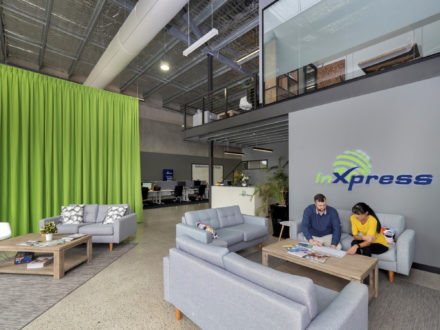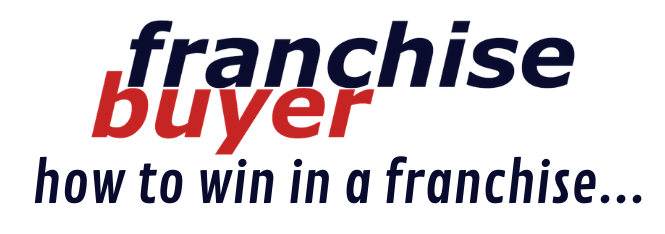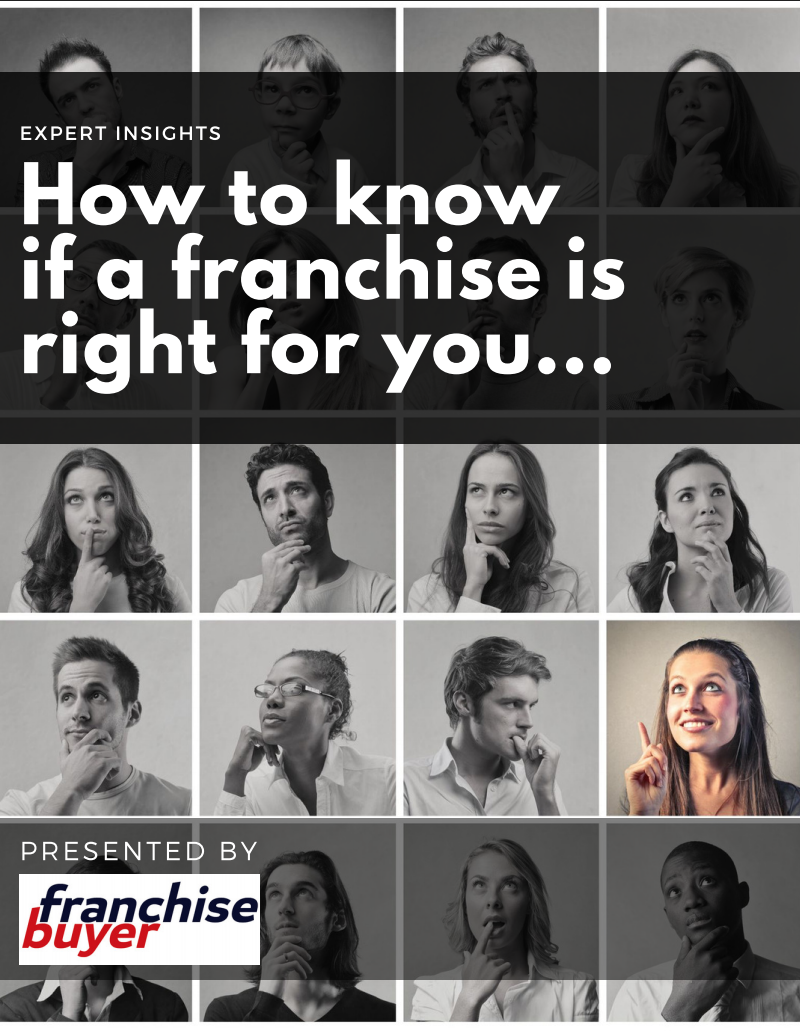April 05, 2019
Franchising’s new wave – low cost with no fixed location, and you’re in business with just a laptop and phone.
David Wilkinson, Asia Pacific franchise sales director for InXpress is so passionate about the model that he intends to become a franchisee — when he gets the time, that is.

InXpress is a global freight consultancy franchise
InXpress is a global freight consultancy franchise specialising in helping small business to take the hassle out of freight logistics. The idea is to streamline the customer’s local and international shipping services, saving time and money. The role of an InXpress franchisee is to hunt down potential customers — door-to-door, over the phone or online — and explain how the system works. The customer does all their bookings online on InXpress’ web-based shipping platform, Webship, which integrates with the company’s major carrier partners such as DHL and TNT.
With 47 franchisee partners in Australia and 350 worldwide, InXpress has just marked 20 years in the freight game (10 years in Australia) with a big anniversary celebration in Fiji. Asia Pacific franchise sales director David Wilkinson has been with InXpress for three and a half years, and is a passionate advocate of the franchise system and the success of the individual franchisee. He reckons one of the key differences of the InXpress model — and a major benefit to its franchisees — is that it’s completely non-geographical.
“Because a lot of marketing and business is done by referral or word of mouth, our franchisees are able to pick up customers anywhere in the country despite where they may live,” says David.
He adds that it completely eliminates the downside of a bad location or random occurrence creating “haves and have-nots” within the franchise. “Often a franchise organisation’s best franchisee can be determined by location, not how hard you work or how good a promoter you are. We take away any ‘bad luck’ that can be passed on to a franchisee — say roadworks in the area or another, similar, business coming in.”

InXpress franchisees are purely customer-facing, signing them up and dealing with any logistics enquiries they may have. The franchise does all the heavy lifting.
“As soon as a customer does a booking, if it’s international, DHL or UPS will pick up the parcel and take it to its destination,” says David. “Our franchisees don’t touch the parcels at all. The major carriers handle transport, InXpress does the invoicing and collections from head office and the franchisee does the customer service. Because our customers ship all the freight themselves via our online shipping platform, it means our franchisees don’t have to be there when the freight is being sent. So it creates a passive re-occurring income.”

Buying power advantage
The company uses its bulk buying power globally to leverage large discounts and pass them on to the SME customer, who with a fairly minimum monthly freight spend, can’t swing anywhere near as much weight with the major transport operators.
“Our discounted buying power means we’re able to buy the service at a significant discount from normal market pricing — and we can then pass that on to an SME, with the franchisee margin also included.” says David. “It’s basically buying low and selling at a slight discount that the customer wouldn’t normally get. We talk about ‘margin’ in our system a lot because that margin is shared between franchisee and franchisor. In this business, revenue doesn’t really mean much — the vast majority of the revenue goes to the carrier.”
You might think the business set- up, with no defined territory, would mean franchisees end up competing with each other. You’d be wrong.
“Because the freight logistics market is so incredibly fast — through domestic door-to-door or palletised or international express — the market is just so big our franchisees don’t see it as competition,” says David. “While we’ve got a centralised system that allows a franchisee to sign up a current InXpress customer, it’s very seldom they’d come across that opportunity. If they do find a customer who’s already using InXpress, we’ll just ask them how they’re going and no harm done.”

Sustained double-digit growth
Of course, another reason franchisees aren’t competing with each other is that business is pretty good right now — and has been for a while, with solid double-digit growth year on year for the past four years.
“In terms of revenue, shipments and franchisees joining our network, the growth has been incredible,” says David. “Last year we had 24 per cent increase in our margin growth and the year before was closer to 30 per cent.”
And customers have been queuing up to get on board because what’s on offer represents a quantum shift in cost-efficiency.
“The vast majority of customers use Australia Post as a default carrier,” says David. “We can certainly save them money, but also give them a speedier, more reliable service using someone like DHL. It’s an easy sell when you come across something like that.”
He admits there’s been a slight shift in the InXpress target market. “Our business has always been business-to-business. Traditionally, the best way to acquire those customers has been door-knocking. That’s really been powerful in the past 10 years, but not a lot of our competitors are doing it now. That’s what sets an InXpress franchisee apart from an account manager with a direct carrier — the SME customer gets to meet the person who will be helping them face-to-face. They can see that value. But in the past 18 months, the e-commerce sector has also flourished and we get those customers via our digital marketing efforts. It’s easy to find out who’s shipping internationally because they all have websites.”
In a nutshell, the customer gets personal contact, feels more secure and can ship goods at a cheaper rate — plus, if something goes wrong, the franchisee is just a phone call away from solving the problem, says David.
“They’re working with someone as their personal freight consultant. With freight logistics there are always issues like bad weather, or freight getting damaged, lost or stolen. The customer can call the franchisee directly and get it sorted. Because of our relationships with our carrier partners, we’re afforded special attention — we have a key accounts desk at our major carriers. It’s a much more personal service, which you get when you spend millions of dollars a year with that carrier. We’re a big deal as opposed to our average customer, who might be spending about $1,000 a month on freight. For our major carriers, we’re in the top five customers in the country for spend. So we get VIP treatment in that sense.”

Building a $3million+ business with no staff
A major enticement to become an InXpress franchisee has to be the minimal entry cost, which at $64,950 (plus GST) is considerably lower than the average franchise cost.
“It’s quite often the auxiliary costs that come with a franchise or small business that hurt, but with us it’s a franchisee, a laptop and a mobile phone — you can build a business generating more than $3 million in revenue with no staff and no requirement for anything locally. We encourage our franchisees to outsource things like customer service. We’ve got relationships and partners based overseas who are able to provide customer service.”
New franchisee recruits could never complain about lack of support. Along with brand marketing collateral, the franchisees have access to all of the software — a two-week intensive boot camp, 8am to 6pm every day, the first week featuring InXpress founder, global board member and chief training officer Ken BrockBank.
“Ken comes over from the US and spends the first week with the new recruits and we talk about our four- step sales process,” says David. “A lot of people join this business with varied backgrounds, so whether it’s a 30-year sales veteran or someone straight out of university, we teach them consulting sales the right way — basically everything from the minute you walk through the door of a potential customer — what you need to do, say, experience to get to the next stage of the sales process. We do in-house ‘store-front’ activities in live action.”
He adds there will be very little time for a new recruit to catch their breath.
“We’ll also start making calls through the week to potential customers, setting appointments for the first week out of boot camp. When they leave boot camp, they leave not just with knowledge, but with a couple of weeks filled with appointments.”
Essentially there will be 12 weeks that we talk about online marketing and things like that; another 12 weeks about what a consultant is and does. We go through a series of modules that a franchisee will complete post boot camp. One of the biggest things is mindset. Because when you’re out all day seeing potential customers, it’s easy to feel on your own, so we make sure we’ve got regular catch-up calls, team sessions and mentoring between franchisees.”

All board members are, or have been franchisees too
David says that the company looks at its franchise model as a bit like a marriage.
“We need to have a relationship for a long time. The people with the longest tenure are making the most money because they’re building up a customer base week in, week out. The longer these guys stay a franchisee, the more money they make and the more money we make. We’re trying to build relationships over a long period of time and you do that by being supportive of your franchisees. We’re staunch in the fact that we absolutely don’t make money from franchise sales in all of our countries. It’s a cost-neutral exercise — we’re only going to make money from franchisees if they make margin. We talk about our system being win-win- win, where franchisee wins, franchisor wins and our carrier partners win (including end customers too).”
David is so keen on the franchise model that he’s considering becoming a franchisee himself.
“There could be an opportunity in the next few months,” he says. “Our entire global board have been, or are currently, franchisees — we put our money where our mouth is in that sense. So when the opportunity arises, I’ll definitely be joining our network as a franchisee — when it’s the right time.”
But things might be a little busy for David for a while.
“For the next 12 to 18 months we’re focusing on what will make the biggest impact in terms of franchisee growth and performance,” he says. “It comes down to doing the basics really well. Taking the next step in terms of franchisee profitability — not just looking at a franchisee’s profit and loss, but helping them benchmark their P&L statement across their network to ensure they’re thriving in the InXpress model and continuing to grow that business.”
David’s philosophy is simple.
“In a business, while cashflow is king, franchisees being profitable will take away every single problem you’ll ever have. You won’t complain about people not getting back to you, or if you have an IT problem, as long as you’re making huge amounts of money. That’s what drives the business — putting franchisees in a position to be profitable. We’ve taken big strides over the past three years, and we’re getting to a position where franchisees are starting to set themselves up for the rest of their lives.”















